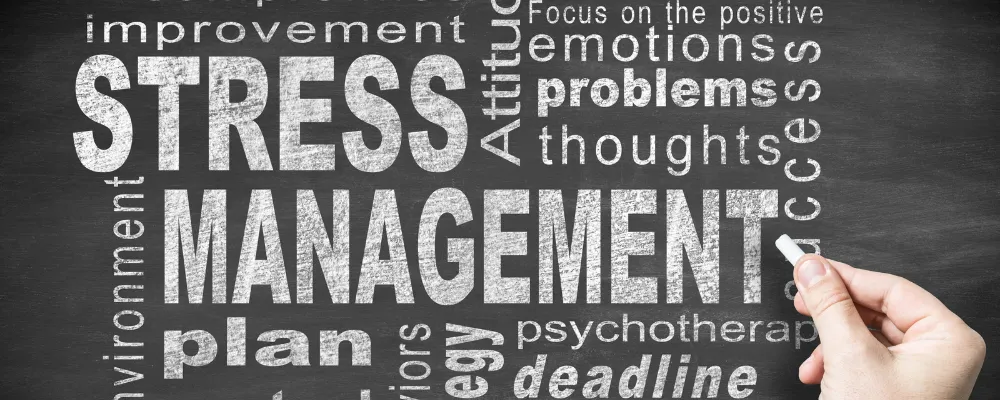Unmasking the Stress: An Introduction to Stress Management
Stress management is a critically important skill for anyone serving as a helping professional. Whether you're a police officer, paramedic, firefighter, or any other type of first responder, it's essential to understand how to manage stress effectively. In this blog post, we'll explore what stress management is and how it can help you to be more successful in your role as a first responder.

Stress management involves recognizing and dealing with the physical, mental, and emotional stress that can come with a first-responder job. It may include mindfulness practices like deep breathing and progressive muscle relaxation, as well as strategies such as developing healthy coping mechanisms for stress, taking time to talk through stressful situations with others, or engaging in activities that promote relaxation.
What is Stress Management?
Stress management is the practice of identifying and addressing sources of stress that can interfere with job performance. It involves developing strategies for dealing with difficult situations and managing emotions that can lead to burnout or physical illness if left unchecked. It also includes techniques like relaxation techniques, time management skills, and problem-solving skills that can reduce stress levels and improve overall job performance.
Additionally, stress management can involve changing work habits, such as taking regular breaks from work to reduce stress levels and having proper nutrition during the day. Learning and practicing stress management skills can help you better cope with job-related stress, leading to increased productivity in the workplace and an overall sense of well-being.
By taking the time to address sources of stress, you can make sure you are performing to your full potential and being successful in the workplace. Stress management is an important skill that everyone should learn in order to ensure a healthy and productive work environment.
Why Managing Your Stress is Important
Our stress response can take many forms, manifesting both outside and within the body. When our bodies perceive stress - whether it be in response to a lion or job security - the Hypothalamic-Pituitary-Adrenal (HPA) axis is activated, releasing cortisol which gives us the energy to confront threats. Initially, this energizing effect helps us cope with new situations; however, if we are exposed to too much stress for an extended period of time, then this will eventually lead to exhaustion as our systems were not designed for perpetual stimulation over long spans of time.

Experiencing frequent or intense stressors over time can disrupt the body's relaxation response, leaving it constantly in an alert state. Chronic stress can also weaken our immune system. This has profound effects on our mental and physical well-being if left unchecked.
Stress can be more than a nuisance – it has far-reaching consequences that not only impact your mental state but also affect your physical health. A prolonged battle with stress may put a strain on relationships and drain energy levels beyond repair.
How we feel in our minds can have a powerful impact on how well our bodies function; stress from relationships, finances, or life changes can take its toll on physical health. Conversely, unhealthy habits and conditions such as high blood pressure and diabetes also bring added mental burdens that contribute to elevated levels of anxiety. To stay healthy both mentally and physically, it's important to learn effective ways of managing the stresses in your life.
Organizational Training in Managing Stress
If you're interested in improving your overall well-being and as well as the resilience of your organization, consider hosting one of our Psychological Body Armor™ one-day courses. Developed by Dr. George S. Everly, Jr., PhD, this training provides practical and evidence-based techniques to bounce back from adversity and enhance your overall immunity to career and life stressors. Simply said, this training can change your life... for good.
The Benefits of Stress Management
When it comes to managing job-related stress, there are numerous benefits to using effective stress management strategies. First, by reducing stress levels, you'll be better able to focus on the task at hand without becoming overwhelmed. This means that you'll be more productive in your job duties and will be better able to make decisions quickly when necessary.
Additionally, your physical health will benefit from lower levels of stress since chronic stress has been linked with a variety of physical ailments, including high blood pressure and heart disease.
Finally, reducing stress will help you maintain better relationships with coworkers, which will improve morale and make work more enjoyable overall.
Overall, stress management is essential for both your psychological and physical well-being. By finding ways to reduce job-related stress, you’ll be able to perform better in the workplace while also improving your quality of life. Make sure to take time out of your day to relax and find healthy outlets for stress relief, such as exercise or meditation. Doing so will help you maintain a healthy balance between work and home life, allowing you to be more successful in your job.
The benefits of stress management are clear, so make sure you practice it regularly! Taking the time to reduce stress levels can have significant positive impacts on both your physical and mental health. It's important to remember that stress is inevitable, but managing it can help you stay focused and productive in the workplace. So don't hesitate to take a break or find ways to better manage your stress levels. In the long run, it will benefit both you and your job.
How to Manage Stress
There are many different tactics that can be used to manage job-related stress effectively. First off, it's important to identify areas where you may be feeling extra pressure or anxiety so that you can start working on solutions right away. Additionally, it's important to recognize when it's time to take a break from work or ask for help from coworkers so that small problems don’t become bigger ones down the road. Lastly, implementing a stress management plan that includes exercising regularly or practicing mindfulness activities like deep breathing or meditation can help reduce long-term levels of stress significantly over time.
Stress Management Techniques
1. Exercise regularly

Exercising regularly is one of the best ways to manage stress. Not only does it help you stay physically fit, but it can also provide an outlet for releasing emotions and tension that can often lead to anxiety or depression. Exercise helps release endorphins, which are hormones that act as natural painkillers and create a feeling of euphoria. This makes exercising a great way to reduce stress levels in the body and improve overall mental health. Additionally, regular exercise has been shown to reduce symptoms associated with mild depression and anxiety disorders while improving moods, self-esteem, sleep quality, concentration, energy level, and motivation.
2. Practice mindfulness
Mindfulness is the practice of being present in the moment and recognizing our thoughts, feelings, and sensations without judgment. It has been shown to help people manage stress, anxiety, depression, pain, fatigue, and other emotional challenges. Practicing mindfulness can also improve your focus and concentration so that you can better handle difficult situations. By allowing yourself to be aware of your own thoughts and emotions as they arise in each moment without judging them or trying to change them immediately, it can help reduce stress levels by providing a sense of control over your environment. Furthermore, practicing mindfulness helps us become more aware of our physical body's needs, such as when we need rest or nourishment, which allows us to take care of ourselves before feeling overwhelmed with stress.
3. Eat a healthy diet

Eating a healthy diet is one of the most important steps you can take to manage stress. When we're feeling overwhelmed and anxious, it's easy to reach for unhealthy snacks or convenience food that might provide short-term comfort but won't do much in terms of nourishing our bodies. Eating nutrient-rich foods helps us maintain energy levels and cope with stress more efficiently while keeping our immune systems strong. A balanced diet also ensures that we get all the vitamins, minerals, and other essential nutrients needed for good health.
4. Get enough sleep

Getting enough sleep is one of the most important things we can do to help manage stress. Sleep helps us recharge our bodies and minds, allowing us to better cope with stressful situations. Studies have shown that people who get adequate amounts of restful sleep are better equipped to handle difficult tasks and remain calm in challenging situations. In addition, getting enough sleep helps improve mental clarity, focus, and concentration – all essential for managing stress effectively. Furthermore, regular quality sleep also boosts our moods by releasing feel-good hormones like serotonin and dopamine into the bloodstream. So if you’re feeling overwhelmed or anxious due to an upcoming deadline or a hectic day at work, make sure you take some time out for yourself at night and get some well-deserved shut eye!
5. Take deep breaths
Deep breathing is a powerful tool to help manage stress and relax the body. It’s simple, free, and can be done anywhere at any time. By taking slow deep breaths, you are helping your body to bring in more oxygen which helps reduce stress hormones like cortisol and adrenaline. Deep breathing also activates the parasympathetic nervous system, which helps to calm down our bodies from the fight or flight response we experience when feeling stressed out. When practiced regularly, deep breathing can become an effective way of managing daily stressors, releasing muscle tension, as well as calming anxiety during times of heightened worry or panic attacks.
6. Talk to friends and family
Talking to friends and family is a great way to manage stress. It's easy, it feels good, and it can be incredibly helpful in times of difficulty. Sharing your worries with someone you trust can provide insight into how best to approach the situation, as well as help put things into perspective. They may also have some ideas for how to handle the issue that you hadn't considered before. Additionally, simply having a listening ear who understands what you're going through and offers support can reduce stress levels significantly. Talking about your problems with others is an important part of managing stress—and getting through difficult times more easily!
7. Moderate alcohol intake
When it comes to stress management, one of the most important habits you can develop is moderating your alcohol intake. Although drinking in moderation has been found to have some health benefits, excessive consumption can lead to a range of negative consequences, such as increased anxiety and depression. By making conscious decisions about when and how much alcohol you consume, you can reduce the amount of stress in your life.
Consuming moderate amounts of alcohol may help relax both your body and mind after a long day or difficult situation. But make sure not to overdo it – even small amounts are enough for relaxation purposes. But don't overdo it. Recent studies have suggested that alcohol intake can have a significant impact on REM sleep. While moderate drinking in the evening has been found to increase initial sleep time, it reduces the amount of time spent in REM sleep and increases disruption during the later stages of the night. This is due to alcohol's effects, which can impair cognitive functioning and reduce the quality of sleep overall. As such, frequent or excessive consumption of alcohol may lead to long-term negative consequences for both physical and mental health.
8. Identify triggers and manage stressors
Identifying triggers and managing stressors is a key part of effective stress management. Stress can be triggered by many things, such as an event or even something small like a change in routine. By identifying the triggers that lead to feeling overwhelmed or stressed out, you can begin to take steps to manage them more effectively. This could include developing healthier coping strategies, taking regular breaks from stressful situations, or seeking professional help if needed. Taking action on these triggers helps reduce overall levels of stress and allows for better emotional regulation, which benefits both physical and mental well-being. Doing so will also allow for more productive outcomes when faced with challenging tasks or difficult times in life.
9. Set limits on your time commitments
Stress management is an important part of life, and one way to effectively manage stress is to set limits on your time commitments. By setting boundaries for yourself and being mindful of how much time you spend on specific tasks or activities, you can reduce the amount of stress in your life. Setting limits allows you to focus on what's most important and prioritize accordingly so that no task takes too much of your energy. It also helps create balance between work and leisure activities, which can help prevent burnout. Furthermore, setting limits gives you more control over how you spend your time, allowing you to make sure that whatever tasks or activities are taking up the most space in your day are actually meaningful ones. In short, setting limits on your time commitments can be a great way to better manage stress levels in both the short term and long term.
10. Practice positive self-talk
Positive self-talk is a powerful tool for managing stress and improving overall mental health. It involves talking to yourself in an encouraging and supportive way, which can boost your confidence and help you stay focused on the positives. Practicing positive self-talk can be especially helpful when dealing with difficult or stressful situations. By recognizing negative thoughts or emotions and replacing them with more constructive ones, you can shift your perspective to become more optimistic. This can lead to better problem-solving skills, improved focus, increased motivation, and decreased levels of anxiety and depression. Positive self-talk also helps us maintain healthier relationships by allowing us to take responsibility for our own feelings while still being mindful of others' needs. Ultimately, practicing positive self-talk is an effective way to reduce stress levels while promoting healthy psychological functioning in all aspects of life.
Stress management is an essential skill for first responders looking to perform their jobs at an optimal level while maintaining their own well-being in the process. By understanding what causes job-related stress and learning effective strategies for reducing its effects on your body and mind, first responders and anyone working in a stressful profession will be able to stay focused on their work while avoiding burnout along the way. With these tips in mind, you should have no trouble keeping your job-related stress under control!
